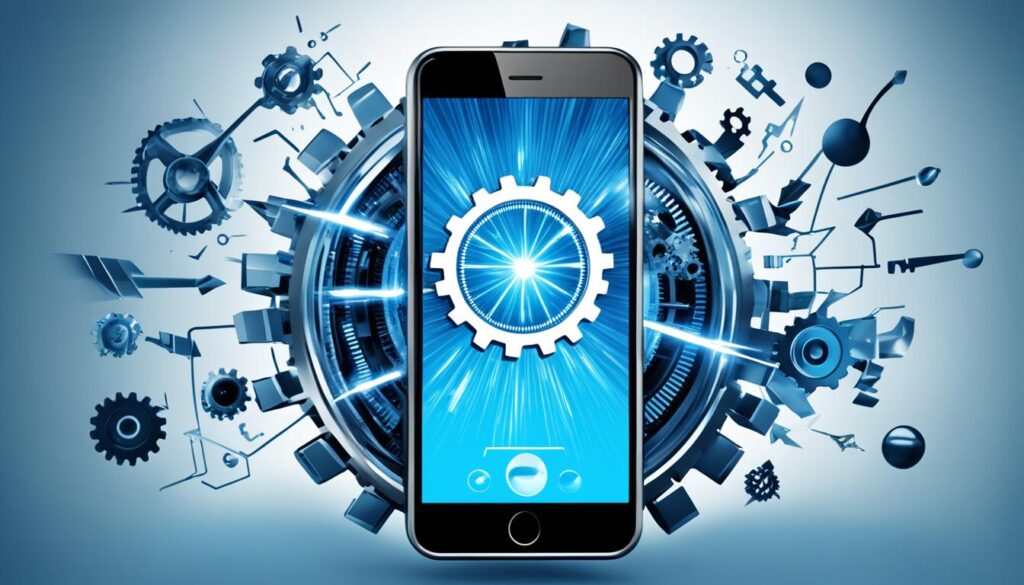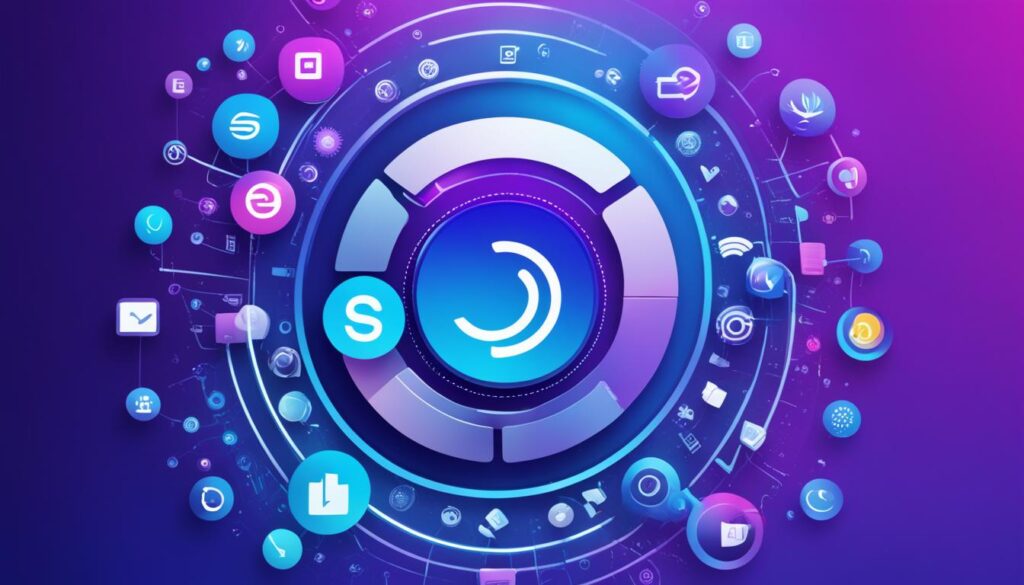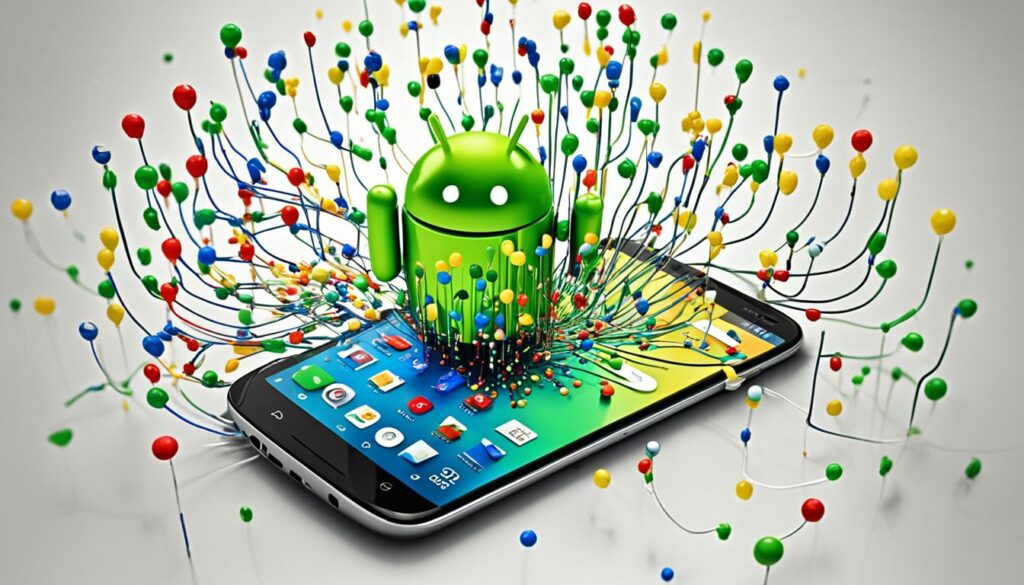Who Started Smartphones? The Pioneers Revealed.
Smartphones have become an indispensable part of our modern lives. From communication and productivity to entertainment and navigation, these powerful devices have revolutionized the way we live and interact with technology. But have you ever wondered who started smartphones? Who were the visionaries behind this groundbreaking invention? In this article, we will delve into the origins of smartphones and reveal the pioneers who played a significant role in their development.
Join us on a journey through history as we uncover the fascinating stories of the smartphone inventors, the companies that led the revolution, and the technological advancements that reshaped the mobile industry. Discover the origins of the term ‘smartphone’ and explore the impact of early operating systems. We’ll also delve into the transformative impact of Apple’s iPhone and Google’s Android, as well as the role of app stores in smartphone adoption.
As we unravel the history of smartphones, we’ll also examine their profound impact on society, exploring how these devices have transformed communication, productivity, and various aspects of our everyday lives. And finally, we’ll look to the future and explore the next wave of smartphone innovations that promise to redefine the way we interact with technology.
Key Takeaways
- The origins of smartphones can be traced back to visionary inventors who had a vision for a new category of devices.
- IBM Simon, Nokia, and Research In Motion (BlackBerry) were among the companies that played a major role in starting the smartphone revolution.
- Symbian OS, Windows Mobile, and Palm OS were some of the early operating systems that powered smartphones.
- Apple’s iPhone redefined the concept of a smartphone, popularizing touchscreens and introducing the iOS ecosystem.
- Google’s Android democratized smartphone technology by providing an open-source operating system.
- App stores, such as the Apple App Store and Google Play Store, played a pivotal role in smartphone adoption.
- Smartphones have had a profound impact on society, transforming communication, productivity, and various aspects of everyday life.
- The future of smartphones holds potential advancements in foldable screens, 5G connectivity, and the integration of artificial intelligence and machine learning.
The Dawn of the Smartphone Era
In the early days of the smartphone era, a new category of devices emerged, thanks to the visionary minds of individuals who saw the potential for revolutionary mobile technology. These pioneers paved the way for the development of smartphones as we know them today.
The First Visionaries
Among the early visionaries who recognized the transformative power of smartphones was Martin Cooper, an engineer at Motorola. Cooper made history in 1973 when he placed the first-ever call from a handheld mobile phone. His invention laid the foundation for the future of mobile communication, inspiring other innovators to push the boundaries of what a phone could do.
A New Category of Devices
Building on the work of pioneers like Cooper, companies such as IBM and Nokia stepped forward to turn the concept of smartphones into reality. IBM’s launch of the Simon Personal Communicator in 1994 marked a significant milestone in the smartphone journey. It was the first device to combine mobile phone capabilities with other functionalities like email, fax, and calendar. This breakthrough device set the stage for the rapid evolution of smartphone technology.
Nokia, too, played a pivotal role in shaping the early smartphone landscape. With the introduction of devices like the Nokia 9000 Communicator in 1996, the company established itself as a leader in the smartphone market. These early smartphones offered a wide range of features, including internet connectivity and productivity tools, further expanding the possibilities of mobile communication.
The efforts of these visionaries and their commitment to pushing the boundaries of mobile technology laid the foundation for the smartphone revolution that would fundamentally transform the way we communicate, work, and live.
Invention of the Term ‘Smartphone’

In the realm of mobile technology, the term ‘smartphone’ holds significant importance. But have you ever wondered where this term originated from? In this section, we will explore the origins of the term ‘smartphone’ and shed light on the individual who coined it.
When it comes to the invention of the smartphone term, there isn’t a singular individual credited with its creation. Rather, it emerged from the collective understanding of the evolving mobile phone industry and the amalgamation of various technological advancements.
During the early 2000s, as feature phones began incorporating more advanced capabilities such as email, web browsing, and productivity applications, the need to categorize these devices arose. The term ‘smartphone’ gained popularity as it encapsulated the idea of a phone that possessed enhanced capabilities beyond traditional voice communication.
“The smartphone is not just a phone but a pocket-sized computer capable of connecting to the internet and running various applications. It represents a paradigm shift in mobile communication and redefines our relationship with technology.” – Unknown
While there is no singular person who can be credited with coining the term ‘smartphone,’ it can be attributed to the collective efforts of multiple visionaries who contributed to the development and evolution of mobile technology. These visionaries envisioned a future where mobile phones would become more than just communication devices, propelling the industry forward.
| Year | Milestone |
|---|---|
| 1992 | Nokia introduces the first phone with a graphical user interface, the Nokia 1011. |
| 1993 | IBM unveils the Simon Personal Communicator, often considered the first smartphone due to its advanced features. |
| 1996 | Palm releases the PalmPilot, a handheld computer that popularizes personal digital assistants (PDAs) |
These early adopters contributed to the foundation of what we now know as smartphones. The term ‘smartphone’ became a common part of our vocabulary, representing a class of devices that have changed the way we communicate, work, and interact with the world around us.
With the invention of the smartphone term, a new era of mobile technology was born. The term served as a catalyst for the rapid evolution of these devices, setting the stage for the innovations and advancements that followed.
Who Started Smartphones: The Companies Behind the Revolution
In the early days of the smartphone revolution, several companies played pivotal roles in shaping the landscape of mobile communication. These companies drove innovation, introduced groundbreaking technologies, and ushered in a new era of smartphone devices.
IBM Simon: The First Smartphone?
One of the remarkable pioneers in the smartphone industry is IBM Simon. Released in 1994, the IBM Simon is widely considered the first true smartphone. It featured a touchscreen display, email capabilities, and even a built-in calendar. Although it was not as advanced as the smartphones we use today, the IBM Simon laid the foundation for future technological advancements.
The Rise of Nokia
Nokia, a Finnish company, also played a major role in the early years of the smartphone revolution. With its iconic models like the Nokia 9000 Communicator, Nokia brought innovation and functionality to the market. The Nokia 9000 Communicator, released in 1996, combined the features of a mobile phone and a personal digital assistant, setting the stage for the future of smartphones.
Research In Motion (BlackBerry) Leads the Market
An influential player in the smartphone revolution, Research In Motion (now known as BlackBerry) dominated the market for many years. The BlackBerry devices, with their physical keyboards and secure messaging capabilities, gained immense popularity among professionals and business users. They offered convenient email access and BBM (BlackBerry Messenger), revolutionizing the way people communicated on the go.
The contributions of these companies, including IBM Simon, Nokia, and Research In Motion (BlackBerry), laid the foundation for the smartphone revolution. They paved the way for the advancements we see in modern smartphones today, where companies continue to push boundaries and redefine the way we connect and interact with technology.
Operating Systems that Powered Early Smartphones

Early smartphones would not have been possible without the development of advanced operating systems that could handle the complex tasks required by these devices. In this section, we will explore three significant operating systems that played a crucial role in shaping the smartphone landscape: Symbian OS, Windows Mobile, and Palm OS.
Symbian OS: Opening the Doors
Symbian OS, developed by Symbian Ltd., was one of the first operating systems specifically designed for smartphones. It gained popularity in the early 2000s and became the dominant operating system for mobile devices worldwide. With its robust features and capabilities, Symbian OS enabled users to perform tasks such as web browsing, email management, and multimedia playback.
One of the notable features of Symbian OS was its support for third-party applications, which allowed developers to create and distribute software for smartphones. This opened the doors to a wide range of applications and enhanced the functionality of early smartphones.
Despite its initial success, Symbian OS faced increasing competition from other operating systems and eventually declined in popularity. However, its legacy can still be seen in the development of modern smartphone platforms.
Windows Mobile and Palm OS
Windows Mobile, developed by Microsoft, and Palm OS, developed by Palm, Inc., were two other significant operating systems that powered early smartphones.
Windows Mobile offered a familiar user interface, similar to that of Windows computers, which appealed to users already accustomed to Microsoft’s software ecosystem. It featured a wide range of applications and offered seamless integration with Microsoft Office and other productivity tools.
Palm OS, on the other hand, was known for its simplicity and ease of use. It provided a user-friendly interface and focused on intuitive navigation and organization of contacts, calendars, and other essential information. Palm OS devices, notably the Palm Pilot, gained popularity among professionals and became synonymous with personal digital assistants (PDAs).
Both Windows Mobile and Palm OS contributed to the early smartphone market, but with the rapid advancements in technology and the emergence of new players in the industry, their market shares declined over time.
Apple’s iPhone: Redefining the Smartphone
In this section, we will explore the revolutionary impact of Apple’s iPhone on the smartphone industry. The iPhone not only redefined the concept of a smartphone but also paved the way for a new era of mobile communication.
The Touchscreen Revolution
The introduction of the iPhone brought about a touchscreen revolution in the smartphone world. Unlike traditional phones with physical keyboards and buttons, the iPhone featured a large, capacitive touchscreen that revolutionized the way we interact with our devices. It allowed for intuitive gestures, such as swiping and pinching, making it easier and more seamless to navigate through apps, websites, and multimedia content.
iOS: A New Ecosystem Emerges
Alongside the groundbreaking hardware, Apple also introduced the iOS operating system, which further solidified the iPhone’s impact on the smartphone market. The iOS ecosystem offered a seamless user experience with a rich selection of apps, advanced security features, and regular software updates. It quickly became a benchmark for other smartphone platforms, setting new standards for performance, reliability, and user satisfaction.
Furthermore, Apple’s App Store provided a platform for developers to create and distribute innovative third-party apps, enhancing the functionality and versatility of the iPhone. This not only expanded the capabilities of the device but also opened up new avenues for businesses and individuals to connect, engage, and entertain through mobile applications.
| Apple’s iPhone Impact: | |
|---|---|
| Redefinition of the smartphone concept | – |
| Popularization of touchscreen technology | – |
| Introduction of the iOS operating system | – |
| Creation of a thriving app ecosystem | – |
| Setting new standards for performance and user experience | – |
Google’s Android: Democratizing Smartphone Technology

This section explores the impact of Google’s Android on the smartphone industry. It discusses how Android democratized smartphone technology by providing an open-source operating system and empowering a wide range of manufacturers to produce Android devices.
The rise of Google’s Android OS marked a significant milestone in the history of smartphones. With the introduction of Android, the smartphone market experienced a transformative shift towards openness and accessibility. Unlike proprietary operating systems, Android was open-source, providing developers with the freedom to customize and innovate.
This democratization of smartphone technology allowed a diverse array of manufacturers, from established industry players to emerging brands, to adopt Android as their operating system of choice. This resulted in an explosion of Android-powered devices, driving competition and choice in the market.
The impact of Android’s democratization can be seen in the increasing affordability and availability of smartphones. The wide range of Android devices caters to different price points and user needs, making smartphones accessible to a broader demographic.
Furthermore, Android’s open nature fostered a vibrant ecosystem of apps and services, thanks to the Google Play Store. Developers were able to create an extensive range of applications, providing users with a rich and diverse experience on their Android devices.
In addition, Android’s compatibility with a variety of hardware configurations ensured that manufacturers could innovate and experiment, pushing the boundaries of smartphone design and functionality.
Overall, Google’s Android OS played a pivotal role in democratizing smartphone technology, making it more accessible, affordable, and inclusive. Its open-source nature and widespread adoption have had a lasting impact on the smartphone industry, shaping the way we use and interact with our devices.
The Role of App Stores in Smartphone Adoption
In today’s mobile-driven world, app stores play a crucial role in the widespread adoption of smartphones. These digital marketplaces serve as convenient platforms for users to discover, download, and update applications tailored to their needs, enhancing the overall smartphone experience. Among the most influential app stores are the Apple App Store and the Google Play Store, each contributing to the rapid growth and evolution of the smartphone industry.
The App Store: Apple’s Game-Changer
The Apple App Store, launched in 2008, revolutionized the way users interacted with their iPhones. With its curated selection of innovative and diverse applications, the App Store transformed the iPhone into a versatile tool capable of catering to various interests and demands. The introduction of the App Store also paved the way for developers to showcase their creations, fostering a vibrant ecosystem of apps that continue to shape our digital lives. Today, the Apple App Store remains a cornerstone of smartphone app distribution, offering millions of apps to iPhone users worldwide.
Google Play Store Levels the Playing Field
Google’s response to the Apple App Store came in the form of the Google Play Store. Launched in 2012, the Play Store provided Android users with a vast selection of applications and games, expanding accessibility and choice beyond the iOS ecosystem. The Google Play Store enabled a multitude of smartphone manufacturers to embrace the Android operating system, fueling the proliferation of affordable, feature-rich devices. With its open and inclusive approach, the Play Store democratized app distribution, empowering developers worldwide to reach a broader audience.
| App Store | Launch Year | Key Features |
|---|---|---|
| Apple App Store | 2008 | Curated selection, innovation, vibrant ecosystem |
| Google Play Store | 2012 | Wide selection, affordability, openness |
Smartphones and Their Impact on Society

Smartphones have had a profound impact on society, revolutionizing the way we communicate, work, and live. The widespread adoption of smartphones has transformed the way people connect with each other, breaking down barriers of distance and enabling instant communication.
With smartphones, individuals can stay connected to friends, family, and colleagues through various communication apps, social media platforms, and messaging services. This constant connectivity has reshaped the way we maintain relationships, allowing for real-time interactions and quick exchanges of information.
Furthermore, smartphones have enhanced productivity by providing access to a wealth of information and tools right at our fingertips. Gone are the days of needing multiple devices for different tasks. Smartphones now serve as our portable offices, allowing us to check emails, manage calendars, access documents, and collaborate on projects no matter where we are.
Smartphones have also had a significant impact on various aspects of everyday life. They have transformed the way we consume media, with streaming services, e-books, and digital content becoming increasingly prevalent. The ability to capture high-quality photos and videos on smartphones has revolutionized the field of photography and allowed for instant sharing of memories.
Moreover, smartphones have become essential tools for navigation, providing real-time maps, directions, and transportation options. They have also become a gateway to accessing information, education, and entertainment, with apps and online platforms catering to a wide range of interests and needs.
The societal impact of smartphones cannot be underestimated. While they have undoubtedly brought numerous benefits and conveniences, they have also raised concerns about privacy, digital dependency, and attention span. It is crucial to strike a balance and approach smartphone usage mindfully, leveraging their capabilities while mitigating the potential drawbacks.
In conclusion, smartphones have revolutionized the way we communicate, work, and engage with the world around us. Their impact on society is far-reaching, touching various aspects of our lives. As technology continues to evolve, it will be fascinating to see how smartphones further shape our future and influence the way we connect and interact as a society.
Future Innovations and the Next Wave of Smartphones
As technology continues to advance at an unprecedented pace, the future of smartphones holds exciting possibilities. This section explores some of the innovations and advancements that we can expect to see in the next wave of smartphones. From foldable screens to 5G connectivity, and the integration of artificial intelligence (AI) and machine learning, these developments promise to redefine the smartphone experience.
Foldable Screens and 5G Connectivity
One of the most anticipated innovations in the future of smartphones is the emergence of foldable screens. This technology allows for a flexible display that can be folded or unfolded, providing users with a larger screen when needed and a compact form factor when on the go. Foldable screens offer new possibilities for multitasking, gaming, and media consumption, providing a more immersive and versatile user experience.
In addition to foldable screens, 5G connectivity is set to revolutionize the way we use smartphones. With significantly faster speeds and lower latency, 5G networks enable seamless streaming, rapid downloads, and real-time responsiveness. This technology will pave the way for more immersive augmented reality (AR) and virtual reality (VR) experiences, as well as advancements in cloud gaming and smart home integration.
Artificial Intelligence and Machine Learning Integration
Artificial intelligence (AI) and machine learning are poised to play a crucial role in the future of smartphones. As smartphones become more intelligent, they will be able to understand and anticipate our needs, providing personalized recommendations, automated tasks, and enhanced user interfaces. AI-powered voice assistants, such as Apple’s Siri and Google Assistant, will continue to evolve, offering more natural language processing and contextual understanding.
Machine learning algorithms will also contribute to improved camera capabilities, enabling smartphones to capture better photos, optimize settings based on scene recognition, and enhance image processing. Additionally, machine learning will drive advancements in battery optimization, app performance, and security, making smartphones more efficient and secure.
With foldable screens, 5G connectivity, and the integration of AI and machine learning, the future of smartphones holds immense potential. These innovations will not only transform the way we interact with our devices but also open up new possibilities for communication, entertainment, and productivity.
Debates on the True Inventor of the Smartphone

The true inventor of the smartphone has been the subject of intense debate and controversy in the tech industry. Various individuals and experts have put forth different perspectives and arguments, each claiming the title of the smartphone’s creator.
At the center of the smartphone inventor debate is a clash between multiple innovators who made significant contributions to the development of mobile technology. Some argue that the true inventor should be credited based on the first concept or prototype, while others focus on the commercial success and widespread adoption of a particular device.
“The creation of the smartphone was a collective effort that involved the dedication, innovation, and collaboration of many brilliant minds in the field of technology.” – Tech Expert
The controversy surrounding the true inventor of the smartphone stems from the fact that the concept of a mobile device with advanced computing capabilities and wireless connectivity was gradually developed and refined over time. It is difficult to attribute the creation of such a complex and multifaceted device to a single individual.
The ongoing smartphone creation controversy serves as a reminder of the rapid evolution and collaborative nature of technological advancements. While the debate continues, it is important to recognize and appreciate the contributions of all the pioneers who played a role in shaping the modern smartphone landscape.
Conclusion
In conclusion, the pioneers who started smartphones have left an indelible mark on the world of technology. We owe a debt of gratitude to visionaries such as IBM Simon, Nokia, and Research In Motion (BlackBerry) for their groundbreaking contributions. These companies played a crucial role in revolutionizing mobile communication and shaping the smartphone landscape as we know it today.
As we reflect on the origins of smartphones, it is clear that the evolution of smart device technology continues unabated. From the early days of touchscreen revolution brought by Apple’s iPhone to the democratization of smartphone technology by Google’s Android, we have witnessed remarkable advancements in recent years.
The impact of smartphones on society cannot be overstated. These devices have transformed the way we communicate, work, and navigate the world around us. With the rapid development of foldable screens, 5G connectivity, and the integration of artificial intelligence and machine learning, we can only imagine what the future holds for smart device technology.
